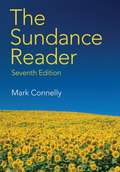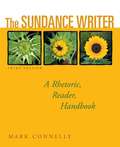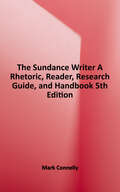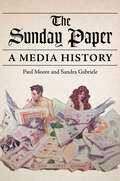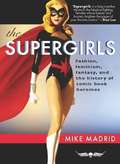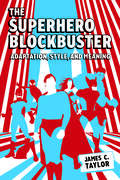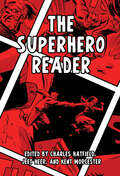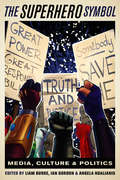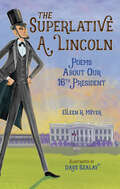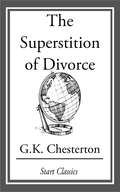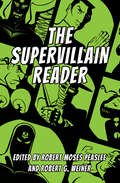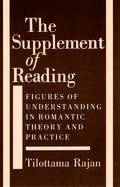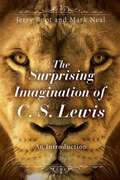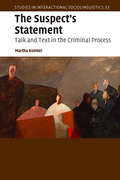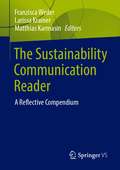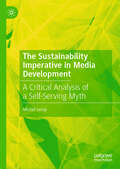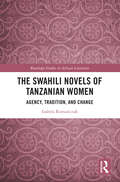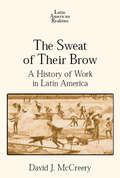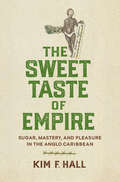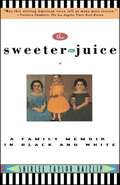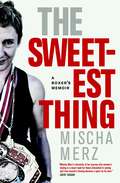- Table View
- List View
The Sundance Reader, 7th edition
by Mark ConnellyTHE SUNDANCE READER, Seventh Edition, features more than 70 concise yet distinct essays drawn from a range of academic disciplines and professions to appeal to a variety backgrounds and interests. Combining classic and contemporary, traditional and provocative, this rich collection of engaging essays and articles emphasizes critical thinking, careful analysis, and effective writing and composition skills. Topics are as varied as the environment, culture, social issues, the media, and business. Selections include works by William Safire, Jessica Valenti, Robert Reich and Al Gore.
The Sundance Writer: A Rhetoric, Reader, Handbook (Third Edition)
by Mark ConnellyThis successful 4-in-1-- handbook, reader, rhetoric, and research guide-- text incorporates electronic writing and visual rhetoric. Practical strategies, real-world emphasis and focus on critical thinking are the highlights of this book.
The Sundance Writer: A Rhetoric, Reader, Research Guide, and Handbook
by Mark ConnellyPraised for its practical strategies, real-world emphasis, and focus on critical thinking, this successful 4-in-1 text (rhetoric, reading, research guide, and handbook) prepares students for writing in college and the workplace. This edition has been revised so that students move more quickly from the writing process to writing in the modes and incorporating research into their writing projects.
The Sunday Paper: A Media History (The History of Media and Communication)
by Paul Moore Sandra GabrielePullout sections, poster supplements, contests, puzzles, and the funny pages--the Sunday newspaper once delivered a parade of information, entertainment, and spectacle for just a few pennies each weekend. Paul Moore and Sandra Gabriele return to an era of experimentation in early twentieth-century news publishing to chart how the Sunday paper became an essential part of American leisure. Transcending the constraints of newsprint while facing competition from other media, Sunday editions borrowed forms from and eventually partnered with magazines, film, and radio, inviting people to not only read but watch and listen. This drive for mass circulation transformed metropolitan news reading into a national pastime, a change that encouraged newspapers to bundle Sunday supplements into a panorama of popular culture that offered something for everyone.
The Supergirls
by Mike Madrid"The Supergirls is a long overdue tribute to the fabulous fighting females whose beauty and bravery brighten the pages of your favorite comics."-STAN LEE"A thoughtful, comprehensive history of women in comics . . . The Supergirls gleefully celebrates the medium itself, in all its goofy, glorious excess." -NPR "Best Five Books To Share With Your Friends" citation"Sharp and lively-and just obsessive enough about women who wear capes and boots to be cool but not creepy. [Madrid] clearly loves this stuff. And he's enough of a historian to be able to trace the ways in which the portrayal of sirens and supergirls has echoed society's ever-changing feelings about women and sex." -Entertainment WeeklyHas Wonder Woman hit the comic book glass ceiling? Is that the one opposition that even her Amazonian strength can't defeat? Entertaining and informative, The Supergirls explores iconic superheroines and what it means for the culture when they do everything the superhero does, only in thongs and high heels.This much-needed alternative history of American comic book icons-from Wonder Woman to Supergirl and beyond-delves into where these crime-fighting females fit in popular culture and why, and what their stories say about the role of women in society from their creation to now, and into the future.Mike Madrid is the author of Divas, Dames & Daredevils: Lost Heroines of Golden Age Comics (forthcoming from Exterminating Angel Press in October 2013) and The Supergirls: Fashion, Feminism, Fantasy, and the History of Comic Book Heroines, an NPR "Best Book To Share With Your Friends" and American Library Association Amelia Bloomer Project Notable Book. Madrid, a San Francisco native and lifelong fan of comic books and popular culture, also appears in the documentary Wonder Women! The Untold Story of American Superheroines.
The Superhero Blockbuster: Adaptation, Style, and Meaning
by James C. TaylorThe Superhero Blockbuster: Adaptation, Style, and Meaning builds an innovative framework for analyzing one of the most prominent genres in twenty-first-century Hollywood. In combining theories of adaptation with close textual analysis, James C. Taylor provides a set of analytical tools with which to undertake nuanced exploration of superhero blockbusters’ meanings. This deep understanding of the films attends to historical, sociopolitical, and industrial contexts and also illuminates key ways in which the superhero genre has contributed to the development of the Hollywood blockbuster. Each chapter focuses on a different superhero or superhero team, covering some of the most popular superhero blockbusters based on DC and Marvel superheroes. The chapters cover different aspects of the films’ adaptive practices, exploring the adaptation of stylistic strategies, narrative models, and modes of seriality from superhero comic books, while being attentive to the ways in which the films engage with the wider networks of texts in various media that comprise a given superhero franchise. Chapter 1 looks back to the first superhero blockbuster, 1978’s Superman: The Movie, examining its cinematic re-envisioning of the quintessential superhero and role in establishing Hollywood’s emerging model of blockbuster filmmaking. Subsequent chapters analyze the twenty-first-century boom in superhero blockbusters and examine digital imaging and nostalgia in Spider-Man films, Marvel Studios’ adaptation of a shared universe model of seriality in the Marvel Cinematic Universe, and the use of alternate timeline narratives in X-Men films. The book concludes by turning its analytical toolkit to analysis of DC Studios’ cinematic universe, the DC Extended Universe.
The Superhero Reader
by Charles HatfieldWith contributions from Will Brooker, Jeffrey A. Brown, Scott Bukatman, John G. Cawelti, Peter Coogan, Jules Feiffer, Charles Hatfield, Henry Jenkins, Robert Jewett and John Shelton Lawrence, Gerard Jones, Geoff Klock, Karin Kukkonen, Andy Medhurst, Adilifu Nama, Walter Ong, Lorrie Palmer, Richard Reynolds, Trina Robbins, Lillian Robinson, Roger B. Rollin, Gloria Steinem, Jennifer Stuller, Fredric Wertham, and Philip Wylie Despite their commercial appeal and cross-media reach, superheroes are only recently starting to attract sustained scholarly attention. This groundbreaking collection brings together essays and book excerpts by major writers on comics and popular culture. While superhero comics are a distinct and sometimes disdained branch of comics creation, they are integral to the development of the North American comic book and the history of the medium. For the past half-century, they have also been the one overwhelmingly dominant market genre. The sheer volume of superhero comics that have been published over the years is staggering. Major superhero universes constitute one of the most expansive storytelling canvases ever fashioned. Moreover, characters inhabiting these fictional universes are immensely influential, having achieved iconic recognition around the globe. Their images and adventures have shaped many other media, such as film, videogames, and even prose fiction. The primary aim of this reader is twofold: first, to collect in a single volume a sampling of the most sophisticated commentary on superheroes, and second, to bring into sharper focus the ways in which superheroes connect with larger social, cultural, literary, aesthetic, and historical themes that are of interest to a great many readers both in the academy and beyond.
The Superhero Symbol: Media, Culture, and Politics
by Henry Jenkins Dan Golding Ian Gordon Neal Curtis John McGuire Steven Conway Liam Burke Jason Bainbridge Mitchell Adams Tara Lomax Claire Langsford Vladislav Iouchkov Naja Later Paul M. Malone Shan Mu Zhao Kevin Patrick“As a man, I'm flesh and blood, I can be ignored, I can be destroyed; but as a symbol... as a symbol I can be incorruptible, I can be everlasting”. In the 2005 reboot of the Batman film franchise, Batman Begins, Bruce Wayne articulates how the figure of the superhero can serve as a transcendent icon. It is hard to imagine a time when superheroes have been more pervasive in our culture. Today, superheroes are intellectual property jealously guarded by media conglomerates, icons co-opted by grassroots groups as a four-color rebuttal to social inequities, masks people wear to more confidently walk convention floors and city streets, and bulletproof banners that embody regional and national identities. From activism to cosplay, this collection unmasks the symbolic function of superheroes. Bringing together superhero scholars from a range of disciplines, alongside key industry figures such as Harley Quinn co-creator Paul Dini, The Superhero Symbol provides fresh perspectives on how characters like Captain America, Iron Man, and Wonder Woman have engaged with media, culture, and politics, to become the “everlasting” symbols to which a young Bruce Wayne once aspired.
The Superior Person's Book of Words
by Peter BowlerA resource for those who consider themselves superior to discover if they really are. Only those who are truly superior will know how to use these words though some will be familiar.
The Superkids Hit Second Grade, Word Work Book Level 5, Grade 2
by Valerie Tripp Pleasant T. Rowland Norm BendellNIMAC-sourced textbook
The Superkids Take Off, Second Grade (The Superkids Reading Program)
by Valerie Tripp Pleasant T. RowlandA Language Arts skill development book intended for second grade.
The Superlative A. Lincoln: Poems About Our 16th President
by Eileen R. MeyerTallest, wisest, most studious--Lincoln was simply superlative!Get to know the personal side of Honest Abe (his LEAST FAVORITE nickname) through fresh and funny poems expressing his superlative nature. Abraham Lincoln is famous for many extremes: he was the TALLEST president, who gave the GREATEST SPEECH and had the STRONGEST conviction. But did you know that he was also the MOST DISTRACTED farmer, the BEST wrestler, and the CRAFTIEST storyteller? Nineteen poems share fascinating stories about events in Lincoln's life, while history notes go even deeper into how he excelled. Don't forget to think of all the ways you, too, are superlative!
The Superstition of Divorce
by G. K. ChestertonBritish writer GILBERT KEITH CHESTERTON (1874-1936) expounded prolifically about his wide-ranging philosophies-he is impossible to categorize as "liberal" or "conservative," for instance-across a wide variety of avenues: he was an arts critic, historian, playwright, novelist, columnist, and poet. His witty, humorous style earned him the title of the "prince of paradox," and his works-80 books and nearly 4,000 essays-remain among the most beloved in the English language.Almost a century ago, Chesteron wrote a series of articles-collected in this replica 1920 volume-decrying the rise in divorce and exploring, from a sociological standpoint, the impact he believed it would have on Western civilization. His conclusions are seen by some as prophetic, but whether one agrees with his cynical stance or not, this is a fascinating work of modern cultural criticism.
The Supervillain Reader
by Robert Moses Peaslee and Robert G. WeinerContributions by Jerold J. Abrams, José Alaniz, John Carey, Maurice Charney, Peter Coogan, Joe Cruz, Phillip Lamarr Cunningham, Stefan Danter, Adam Davidson-Harden, Randy Duncan, Richard Hall, Richard Heldenfels, Alberto Hermida, Víctor Hernández-Santaolalla, A. G. Holdier, Tiffany Hong, Stephen Graham Jones, Siegfried Kracauer, Naja Later, Ryan Litsey, Tara Lomax, Tony Magistrale, Matthew McEniry, Cait Mongrain, Grant Morrison, Robert Moses Peaslee, David D. Perlmutter, W. D. Phillips, Jared Poon, Duncan Prettyman, Vladimir Propp, Noriko T. Reider, Robin S. Rosenberg, Hannah Ryan, Lennart Soberon, J. Richard Stevens, Lars Stoltzfus-Brown, John N. Thompson, Dan Vena, and Robert G. Weiner The Supervillain Reader, featuring both reprinted and original essays, reveals why we are so fascinated with the villain. The obsession with the villain is not a new phenomenon, and, in fact, one finds villains who are “super” going as far back as ancient religious and mythological texts. This innovative collection brings together essays, book excerpts, and original content from a wide variety of scholars and writers, weaving a rich tapestry of thought regarding villains in all their manifestations, including film, literature, television, games, and, of course, comics and sequential art. While The Supervillain Reader focuses on the latter, it moves beyond comics to show how the vital concept of the supervillain is part of our larger consciousness. Editors Robert Moses Peaslee and Robert G. Weiner collect pieces that explore how the villain is a complex part of narratives regardless of the original source. The Joker, Lex Luthor, Harley Quinn, Darth Vader, and Magneto must be compelling, stimulating, and proactive, whereas the superhero (or protagonist) is most often reactive. Indeed, whether in comics, films, novels, religious tomes, or video games, the eternal struggle between villain and hero keeps us coming back to these stories over and over again.
The Supplement of Reading: Figures of Understanding in Romantic Theory and Practice
by Tilottama RajanTilottama Rajan illuminates a crisis of representation within romanticism, evident in the proliferation of stylistically and structurally unsettled literary texts that resist interpretation in terms of a unified meaning. The Supplement of Reading investigates the role of the reader both in romantic literary texts and in the hermeneutic theory that has responded to and generated such texts. Rajan considers how selected works by Coleridge, Wordsworth, Blake, Shelley, Godwin, and Wollstonecraft explore the problem of understanding in relation to interpretive difference, including the differences produced by gender, class, and history.
The Surprise (Fountas & Pinnell LLI Green #Level E, Lesson 53)
by Nancy LingFountas and Pinnell Leveled Literacy Intervention Green System -- 1st Grade
The Surprising Imagination of C. S. Lewis: An Introduction
by Root Mark Neal Jerry RootNarnia, Perelandra—places of wonder and longing. The White Witch, Screwtape—personifications of evil. Aslan—a portrait of the divine. Like Turkish Delight, some of C.S. Lewis’s writing surprises and whets our appetite for more. But some of his works bite and nip at our heels. What enabled C.S. Lewis to create such vivid characters and compelling plots? Perhaps it was simply that C.S. Lewis had an unsurpassed imagination. Or perhaps he had a knack for finding the right metaphor or analogy that awakened readers’ imaginations in new ways. But whatever his gifts, no one can deny that C.S. Lewis had a remarkable career, producing many books in eighteen different literary genres, including: apologetics, autobiography, educational philosophy, fairy stories, science fiction, and literary criticism. And while he had and still has critics, Lewis' works continue to find devoted readers.The purpose of this book is to introduce C.S. Lewis through the prism of imagination. For Lewis, imagination is both a means and an end. And because he used his own imagination well and often, he is a practiced guide for those of us who desire to reach beyond our grasp. Each chapter highlights Lewis’s major works and then shows how Lewis uses imagination to captivate readers. While many have read books by C.S. Lewis, not many readers understand his power to give new slants on the things we think we know. More than a genius, Lewis disciplined his imagination, harnessing its creativity in service of helping others believe more deeply."Truly fresh, rhetorically astute works about C. S. Lewis are rare, but this provocative new volume by Jerry Root and Mark Neal emerges at just the right time to reinvigorate Lewis scholarship beyond the clichés we continue to repeat to each other. The Surprising Imagination of C. S. Lewis delivers just that salvo, an ingenious, empathetic, lavishly informed elucidation of Lewis’s understanding of the life of the imagination." —Bruce L. Edwards, Professor Emeritus of English and Africana Studies, Bowling Green State University, Bowling Green, OH"Our grasp of ‘imagination’ is such a pale and paltry thing; Neal and Root offer a much-needed corrective by illustrating Lewis’s robust use of the word. The happy result is a more accurate and nuanced reading of Lewis. But there is more: through their careful work, we are graced with a rich, new vocabulary to discern and describe the many uses of creative imagination all around us." —Diana Pavlac Glyer, Professor of English at Azusa Pacific University, Azusa, CA, author of The Company They Keep: C .S. Lewis and J. R. R. Tolkien as Writers in Community"This fabulous book on Lewis’s imagination will delight readers new to Lewis and those who, like the authors, have been reading him for decades. It shimmers with the joy of exploration and discovery. The Surprising Imagination of C. S. Lewis is a reliable and inspiring guide not only to Lewis but to a treasure trove of imaginative books that fired Lewis’s own imagination. In Robert Frost’s delightful phrase, this book is the occasion for a ‘fresh think.’" —Wayne Martindale, Emeritus Professor of English, Wheaton College, Wheaton, IL"Jerry Root and Mark Neal make excellent use of Lewis's literary criticism of other authors to show how he employed different varieties of imagination in his own works. The result is a good book about Lewis and an even better one on the capacity of imagination to enrich each of our lives every day."—Mark Noll, Francis A. McAnaney Professor of History, University of Notre Dame, Notre Dame, IN"For nearly four decades I have been reading books and articles in the field of Lewis studies. This volume is one of the most original and fascinating books on Lewis to appear in a long time." —Lyle W. Dorsett, Billy Graham Professor of Evangelism, Beeson Divinity School, Samford University, Birmingham, AL
The Suspect's Statement: Talk and Text in the Criminal Process (Studies in Interactional Sociolinguistics #33)
by Martha KomterWhat suspects tell the police may become a crucial piece of evidence when the case comes to court. But what happens to 'the suspect's statement' when it is written down by the police? Based on a unique set of data from over fifteen years' worth of research, Martha Komter examines the trajectory of the suspect's statement from the police interrogation through to the trial. She shows how the suspect's statement is elicited and written down in the police report, how this police report both represents and differs from the original talk in the interrogation, and how it is quoted and referred to in court. The analyses cover interactions in multiple settings, with documents that link one interaction to the next, providing insights into the interactional and documentary foundations of the criminal process and, more generally, into the construction, character and uses of documents in institutional settings.
The Sustainability Communication Reader: A Reflective Compendium
by Larissa Krainer Matthias Karmasin Franzisca WederThe Textbook seeks for an innovative approach to Sustainability Communication as transdisciplinary area of research. Following the United Nations Sustainable Development Goals, which are intended to transform the world as it is known, we seek for a multidisciplinary discussion of the role communication plays in realizing these goals. With complementing theoretical approaches and concepts, the book offers various perspectives on communication practices and strategies on an individual, organizational, institutional, as well as public level that contribute, enable (or hinder) sustainable development. Presented case studies show methodological as well as issue specific challenges in sustainability communication. Therefore, the book introduces and promotes innovative methods for this specific area of research.
The Sustainability Imperative in Media Development: A Critical Analysis of a Self-Serving Myth
by Michel LeroyThis book critically examines how the media assistance and broader 'development' sector have appropriated the catch-all concept of sustainability, originally rooted in economic and environmental fields, to suit their agendas. Analysing 289 project evaluations conducted globally between 1999 and 2019, it scrutinizes the tacit discourses underpinning what Bourdieu termed “the imperialism of the universal” in fostering media systems in the global South. The book reveals how processes of self-legitimation operate within an increasingly competitive aid market, highlighting a shift from ‘post-missionary’ approaches to business-driven models. Focusing on the often-overlooked African context, it explores nuanced coping capacity in Uganda and the Eastern DRC. Amid questioning of the populist wave as well as power-motivated new entrants, it challenges the recurring aid pattern, emphasizing the urgency of centering social impact and values in media assistance. It offers essential insights for scholars and practitioners navigating the evolving geopolitics of development and public diplomacy.
The Swahili Novels of Tanzanian Women: Agency, Tradition, and Change (Routledge Studies in African Literature)
by Izabela RomańczukThis book provides a rich and full analysis of female Swahili novelists from a feminist perspective, highlighting their important contributions to the living Swahili literary and intellectual tradition.Compared to the diverse and centuries-old oral literature, or religious-philosophical poetry tradition developing since at least the 17th century, the novel is a relatively young phenomenon in the rich body of Swahili literary output, emerging only in the last hundred years. Since then, academia has focused primarily on male novelists, largely disregarding important female writers such as Ndyanao Balisidya, Zainab Burhani, Martha Mvungi Mlangala, Zainab Mwanga, Lucy Nyasulu, and Zainab Alwi Baharoon. This book traces the evolution of women’s writing in Tanzania, highlighting emancipatory and feminist discourses, as well as intersectional themes of class, education, and urbanisation. The author demonstrates how concepts such as utu 'the essence of humanity', aibu 'shame', 'disgrace' and heshima 'honor', 'social respectability' are used in the novels to articulate the value systems and social norms in Swahili communities, including the gendered perceptions of women that they create.Grounded throughout in the historical and socio-political contexts of the authors it discusses, this book will be an important read for researchers of African literature and women’s studies.
The Sweat of Their Brow: A History of Work in Latin America
by David McCreeryThroughout Latin America's history the world of work has been linked to race, class, and gender within the larger framework of changing social, political, and economic circumstances both in the region and abroad. In this compelling narrative, David McCreery situates the work experience in Latin America's broader history. Rather than organizing the coverage by forms of work, he proceeds chronologically, breaking 500 years of history into five periods: Encounter and Accommodation, 1480 -- 1550; The Colonial System, 1550 -- 1750; Cities and Towns, 1750 -- 1850; Export Economies, 1850 -- 1930; Work in Modern Latin America, 1930 -- the Present.Within each period, McCreery discusses the chief economic, political, and social characteristics as they relate to work, identifying both continuities and discontinuities from each preceding period. Specific topics studied range from the encomienda, the enslaving of Indians in Spanish America, the introduction of Black African slaves, labor in mining, agricultural labor, urban and domestic labor, women and work, peasant economies, industrial labor, to the maquilas and more.
The Sweet Taste of Empire: Sugar, Mastery, and Pleasure in the Anglo Caribbean
by Kim HallHow seventeenth-century English literary genres associated with gastronomic and aesthetic pleasure shaped representations of Caribbean colonization and slaveryOver the course of the seventeenth century, sugar prices fell drastically. As this newly affordable luxury made its way from royal entertainments to the closets of home cooks in ever increasing quantities, sugar bound England’s fortunes to the Caribbean. The pursuit of sugar’s pleasures and profits generated newly visible and vexed relationships—not simply between enslaved and enslaver but also between enslaved and consumer—that threatened the English sense of the nation, the household, and the self.The Sweet Taste of Empire explores how the unique emphasis the English placed on confections as a marker of status and national identity offered a framework for grappling with changing notions of race, gender, labor, and domesticity that shaped early colonization. Tracing the literal and literary uses of sugar in seventeenth-century England, Kim F. Hall shows how literary genres associated with gastronomic and aesthetic pleasure shaped representations of Caribbean colonization and slavery, developing a culinary language that functioned as a discourse of pleasure and white innocence. In turn, Hall argues, Caribbean sugar production influenced domestic consumption and trade in England, as well as the very notion of what it meant to be English.Drawing on a wide range of early Anglo-Caribbean texts—from cookbooks and banquet menus to economic poetry, to maps and treatises on plantation labor and health—Hall uncovers what she calls a plantation aesthetic, in which writers mobilize ways of seeing from pastoral, georgic, and landscape discourses when addressing issues of race and enslavement. This plantation aesthetic reveals deep worry over the threat African slavery poses to the imagined idea of English plantations as idealized agrarian life, ultimately shaping the history of both English slavery and the later anti-slavery response. Recentering the Caribbean in early modern literary studies, The Sweet Taste of Empire sheds new light on the aesthetic and the poetic in the archives of Caribbean enslavement.
The Sweeter the Juice: A Family Memoir in Black and White, First Edition
by Shirlee Taylor HaizlipThe Sweeter the Juice is a memoir, a social history, a biography, and an autobiography. Haizlip gives to us the quintessential American story, unveiling truths about race, about our society, and about the ways in which we all perceive and judge one another.
The Sweetest Thing: A Boxer's Memoir
by Mischa MerzJournalist and amateur boxer Mischa Merz fulfills a long-held ambition to travel across the United States and compete in a series of amateur boxing tournaments. On this wild and fascinating journey she meets her idols, including Lucia Rijker of Million Dollar Baby fame, and some other truly extraordinary characters. Merz discovers the horrors and delights of the world of women's boxing and gains insights into this eccentric subculture's place in American life. She also meets some of the pioneers and trailblazers of the contemporary rise in women's boxing as well as some of the younger stars now hoping to make it onto the first women's boxing team in the 2012 Olympic Games.Written in a compelling and highly entertaining narrative style, Mischa Merz takes us right into the ring and reports, with a rare insider's view, on a sport that has for centuries defined our ideas about masculinity.
